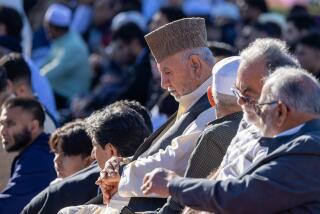Ramadan Puts Fasting Athletes in Tough Spot
- Share via
During the month of Ramadan, two Muslim teenagers on the Magnolia High School basketball team have to execute something tougher than a crossover dribble: playing hoops in the afternoon after going all day without food or water.
Talal Trablci and Khalid Khoudari, who play on the freshman-sophomore team in Anaheim, won’t be alone in competing on an empty stomach. Hundreds of Muslim high school athletes, sprinkled on teams throughout Southern California, face the same challenge: observing a month-long daytime fast while exercising up to four hours a day.
“I’m, like, used to it from last year,” said 14-year-old Khoudari. “I feel that I’m strong enough to play and at the same time fast, which pleases God.”
Ramadan commemorates the revelation of the Koran, Islam’s holy book, to the prophet Muhammad. The Ramadan fast, which ends Dec. 27, is a basic practice of Islam, expected of all Muslims who have reached puberty.
“I’m really proud,” said Mohammed Trablci of his 15-year-old son, Talal, who stands 6 feet tall and weighs 127 pounds--before fasting. “I’m so happy when he comes back from the game, and he’s still fasting. Some people say, ‘I’m tired. I cannot fast.’ But he’s fasting and playing games. That says a lot.”
With the expanding Muslim population--estimated at up to 500,000 in Southern California--an increasing number of high school athletes have developed informal strategies with their coach to compete while fasting.
Todd Jones, the coach of Trablci and Khoudari, allows the boys to take a break from practice to break their fast once the sun goes down. And if a game starts near sunset--as it did Friday--Jones will allow the players to eat and drink something on the bench between breaks in the action.
“They’re great kids,” Jones said. “They listen, and they’re very disciplined as you can tell from the fasting. The only concern I have is for their health.”
Dr. Daniel Kharrazi, who practices sports medicine at the Kerlan-Jobe Orthopaedic Clinic in Los Angeles, said a daytime fast won’t affect most athletes.
“For normal, healthy athletes, they have enough reserves,” said Kharrazi, who is not Muslim. “In terms of performance, it shouldn’t have a significant effect over the short term. But over time, you’ll use a lot more of the body’s reserves.”
He added, “ It’s really not the healthiest thing for the body overall.”
In years past, many Muslim student athletes, often a minority of one at each school, kept their fasting secret from their coach and teammates.
Omar Amr played water polo and swam for Sunny Hills High in Fullerton in the early 1990s.
“I was a little intimidated,” said Amr, who now plays on the United States water polo team. “I was the only Muslim in my high school.”
But Amr pointed to his sister, Aleah, who’s a senior on the girls varsity water polo team at Sunny Hills. He said she talks easily and openly about her faith, partly because she has many Muslim friends on campus.
Still, there aren’t enough Muslim athletes who fast during Ramadan to get on the radar of many athletic administrations.
Dr. James Staunton, commissioner of the California Interscholastic Federation Southern Section, a group that oversees high school athletics, said he hadn’t been aware of the Muslim students’ fast but would bring up the matter to coaches either through a bulletin or at an upcoming meeting.
“We need to alert coaches and schools to be aware of cultural differences,” Staunton said.
Even without official policies, Muslim high school players praise their coaches for keeping an open mind about their faith--and helping them get through their fast.
“My coach had some information about Ramadan already,” said Zafar Jadwet, 16, who plays on the junior varsity soccer team for Royal High School in Simi Valley. “He was OK with it.”
Jadwet and other athletes said they don’t want special treatment but occasionally get it.
“Our team got in trouble during practice and had to run laps--a mile,” said Jadwet, whose team recently played four games in five days. “My coach told me I didn’t have to do it.”
Other players at Magnolia appreciate what their Muslim teammates are going through, especially after many tried to fast for a day.
“They couldn’t do it,” said Khoudari, laughing. “They couldn’t make it past lunch.”
More to Read
Get our high school sports newsletter
Prep Rally is devoted to the SoCal high school sports experience, bringing you scores, stories and a behind-the-scenes look at what makes prep sports so popular.
You may occasionally receive promotional content from the Los Angeles Times.






